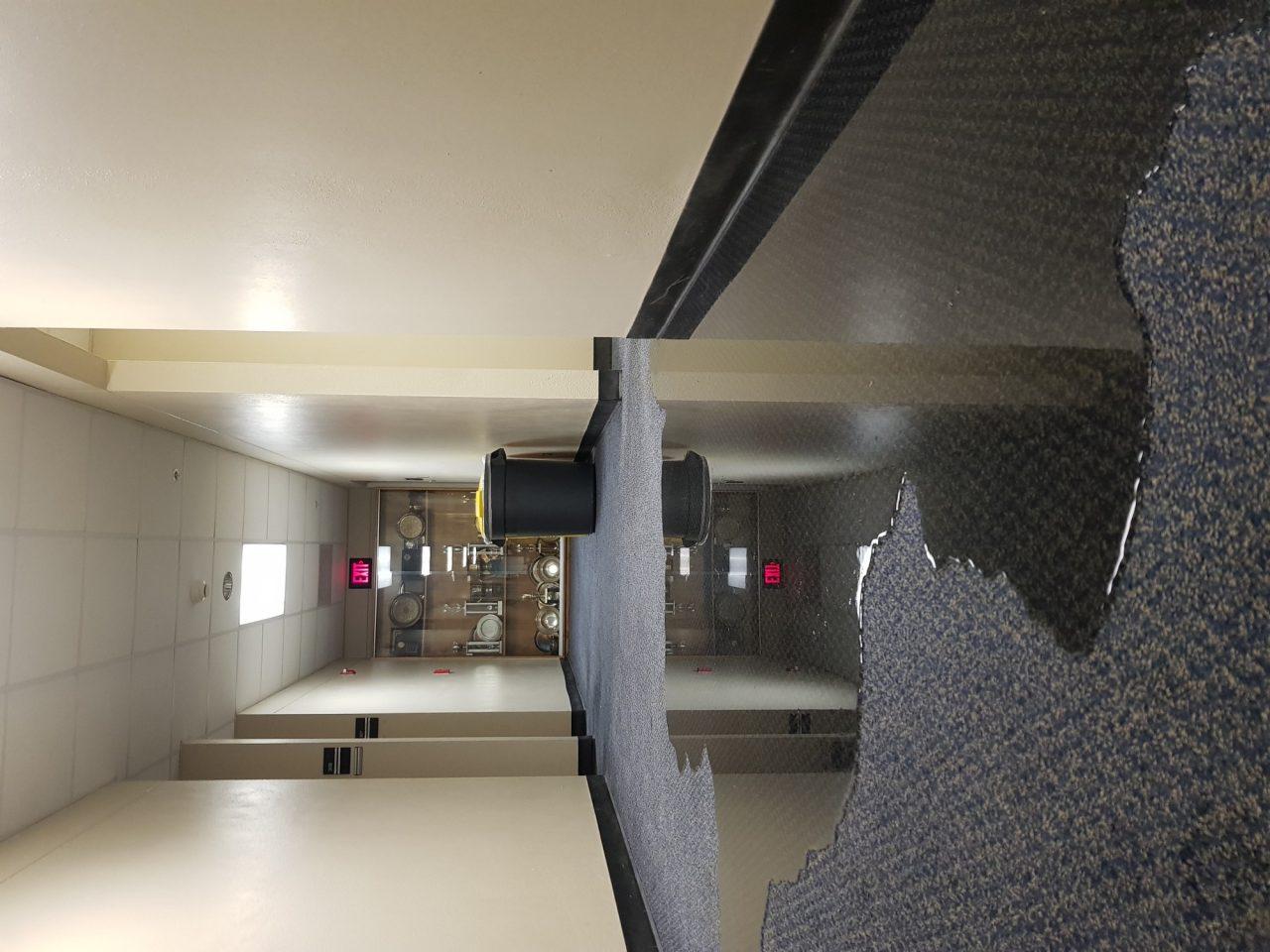Photo provided by Elizabeth Nelson.
This is an updated version of a story that was published online on Friday, Sept. 20.
Water flooded multiple spaces in the Ruth Taylor Theater Building Friday morning, including the Stieren Theatre, the debate room and the paint studio. This is the second building to flood on upper campus this month.
Sophomore and theatre student Cole Castaneda was in the building when it happened.
“When I walked in there were people, a bunch of professors and Jodi [Karjala], who works in the costume studio, were talking about something, and it sounded like there was running water,” Castaneda said. “I went and looked, and on the bottom floor there was water on the wall.”
By the time members of the Department of Human Communication and Theatre noticed water dripping down the inner walls of the building, multiple rooms had already flooded.
“At that point, the pipe had already burst and flooded areas,” said Andrew Hansen, professor and chair of the department, the day of the flooding. “It made it to the paint studio, to the crossunder [below the stage]. There’s two inches on the stage, there’s water even in the first area of seating. It’s a lot of water.”
TUPD closed off the building shortly after 2 p.m. on Friday due to maintenance concerns. The building reopened on Monday.
In a follow-up interview, Hansen explained that the main damage may be to the department’s automated rigging system, used to raise and lowery stage equipment, including lighting and scenery. The department is waiting on an inspection from the manufacturer to determine potential damage.
Additionally, when the power went out across campus on Monday, the compressors that held water back from the air conditioning pipes turned off, and water escaped again.
According to Jim Baker, senior director of Facilities Services, a pipe broke in the top floor of the building.
“One of the valve cases split up on the fourth floor,” Baker said. “There’s a duct chase — a wall cavity where the sheet metal ductwork drops down between floors — and it, of course, provided the fastest way for the water to escape the room.”
The pipes in Ruth Taylor are operated by pneumonic valves, air-driven control valves. Because of the break, Facilities Services will have to replace the valve and associated piping.
“Part of the process would be eliminating the rest of the pneumatic valves on that level, converting them all to electronic valves,” Baker said. “It is a longer term project now that we have to look at the rest of the valves in the building and assess their condition.”
Baker said that the flooding is unrelated to the flooding that happened in the Dicke Art and Smith Music Building earlier this month.
“Those particular pipes in Ruth Taylor, they’re right at their useful lifespan,” Baker said. “These valves are right at their expected lifespan, so we need to begin to replace all the valves in that building.”
Buildings are renovated on a 20-year cycle, according to Baker, and all mechanical components get replaced as a part of those remodels.
“The problem here is that Ruth Taylor hasn’t gone under any remodel that would trigger that kind of mechanical replacement,” Baker said. “The building itself is mostly auditorium, and there’s a small office suite. The auditorium is all up-to-date electronically, the rest of the building has been architecturally maintained, but it has never had a remodel at the volume that we would generally see all of those mechanical systems replaced.”
Baker said the repairs are manageable within the Facilities Services budget.
According to Hansen, the location of the first show, the Attic Theatre, was not affected by the water. Additionally, the box office, offices on the main floor, scenic shop and costume studio were not affected.
For now, the main concern is the wetness and the smell within the theatre.
“We’d need good air-conditioning for evening shows, but the air-conditioning is working in lots of places,” Hansen said. “The main thing the faculty is concerned about is the smell, the potential mold that may grow from the wetness.”
Though drying out the carpet and getting rid of the smell are smaller, more manageable problems, fixing the pipes is a larger issue.
“There’s asbestos around the pipes, so there needs to be asbestos abatement before they can even cut and replace parts of those pipes. It’ll be a little while,” Hansen said.













